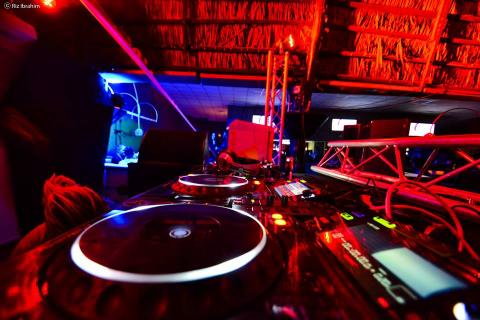Water and Turntables with Mateyo Bonham
Jan 09,2017
Mateyo Bonham, a 35-year-old international environmentalist who has a shared passion for clean water and electronic music, talks about the underground music scene from Nairobi, Kenya to Denver, his career and how both of these factors have and will continue to play a significant role in his life. He is composed, kind, open and calm as we sit at the dormant yet comfortable veranda of Starbucks at the Tivoli Student Union. It’s a cloudy winter day and I listen intently to the six foot four man that towers across the table from me.
By: Jerusha Kamoji
What is your favorite genre of music and why?
Given my profession, I would say that my favorite genre of music is electronic. Most people think that only means EDM but it’s so much more than that, it’s all encompassing. There’s ambient electronic, experimental electronic and deep house as I’m sure you know about. It’s amazing because all these different genres follow a specific beat which is what makes them electronic, yet they’re so different in their sound due to all the different acoustics that are incorporated.
How were you inspired to become a DJ?
When I was fifteen I started going to raves in the Midwest. They were amazing and these were the days where you only got flyers as invitations to parties. This is what made these parties so underground and what got me hooked. I would stare at the DJ and watch him perform. Going to these parties, seeing the community of underground ravers got me passionate about this form of music. After high school I went to Zambia with the peace-corps for four years to work in natural resource management. When I got back I bought my first pair of turn tables and started to teach myself through watching other DJ’s perform as well as practicing. I haven’t been able to stop since.
Tell me about your career pursuits.
Being a DJ is strictly a hobby for me. After the peace-corps I got a masters in global public health from George Washington University. Now I work with W.A.S.H. which is a water and sanitization hygiene organization that sends me all over the world to rural communities. I do research on ways to find sustainable clean water for these communities especially within sub Saharan Africa. I recently left Nairobi where I worked with Nairobi Aquiaya. I’ve also worked with Deloitte here in America however that was mainly consultancy. Being in an office everyday really isn’t my style.
Being a DJ can have some certain strata surrounding it, specifically regarding the drug culture and party scene. How do you stay focused on your hobby whilst still being able to enjoy what you do?
Like I said, being a DJ is strictly a hobby however it’s also a job. People are paying money to come and see a performance and I think -- regardless of what that performance is -- you must take it seriously. I don’t drink much and I have a good time through the music and the crowd. I also never expect any compensation.
A lot of critics have said that underground music often sounds similar and to an extent boring, how would you contradict this statement?
I think it really depends on what your passionate in. When you love something you’re more attune to the subtleties. You get to know about it more, especially when you start playing and producing music. There are so many variations of underground music as I’m sure there are so many variations of rap music, which to me, may all sound the same. If we’re not interested in something we pay less attention; it immediately becomes boring or whatever predisposed opinion we may have about it and that’s fair. However with underground I feel different, and that’s because I love the music.
What is the hardest part of being a DJ and why?
Dealing with people that haven’t come there for the right reasons. Naive people come to events thinking you’re a request DJ or something. I feel quite annoyed because I’ve spent time to create and produce this set that I think will be something new and enjoyable to the crowd. It’s underground, I’m not going to play something by Rihanna or Drake. Or you have people that want to talk to you during your set (laughs). Of course you be polite, however I’m really trying to focus on what I’m playing and I can’t talk to you while I’m working on incorporating my next track with this tune at exactly the right time. I’m also somewhat of an introvert and playing allows me to create something whilst still being part of the experience. I can’t do that with requests and conversation during my set.
As you know, there are tons of underground DJ’s all over, especially in Nairobi. What is it that makes you distinct?
As I’ve matured as a person and as a DJ I guess, I have found I am more likely to play what I am passionate about rather than just what the crowd wants. It’s easier to appease the crowd, but I find changing genre’s, taking risks, it invokes a response and that’s what keeps people interested. Of course you have to find a balance between what the crowd wants to hear and what you want to play. However, I find these two are often corresponding and adding that spice to what they want to hear, I guess that’s what makes my music mine.
What aspirations do you have regarding your career in music in the future?
I will definitely keep playing however being a DJ will always be a hobby. I hope to continue working with W.A.S.H and get posted somewhere else after my girlfriend finishes her graduate program at the University of Denver.






